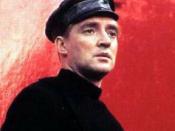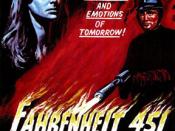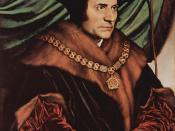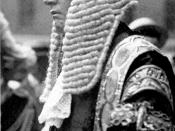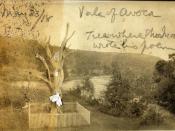Loyalty to one's own conscience and beliefs is key to maintain identity. Guy Montag the main character of "Fahrenheit 451", and Sir Thomas Moore the main character of the play "A Man for All Seasons" both play roles as the Hero's of their respective works of literary genius. Many hard decisions and challenges are put before them, but they both manage to succeed on their own terms, and by what they deem to be "the right thing to do."
In the beginning of "Fahrenheit 451", Guy Montag's job, as a fireman, is to burn books. Montag lives in a world filled with censorship, where the society is desensitized and kept under control by the static of the TV set, and the bottles of pills on the bedside table. He slowly starts to rebel against his society by reading books and asking many questions. He befriends a retired English teacher in order help him break free from the oppressive ignorance of his society, and to help him understand the value of books.
The Captain of the Fire Department, who is very educated, tries to break Montag and turn him back into a complying citizen. Beatty fails in his attempts: Montag cannot forget all that has been revealed to him. He torches Beatty with a flamethrower, and escapes, from the law, to the railroad tracks where he encounters others who share his views.
Sir Thomas Moore is a scholar, a statesmen and a devout catholic. The play takes place in England during the reign of Henry VIII. When Henry VIII declares the Act of Succession, proclaiming his divorce from Queen Catherine, Moore keeps his opinions to himself, for his own safety, even though it is widely known that his own personal morals and faith go against King Henry's divorce. Moore, becoming Lord Chancellor of England, is then asked to sign the act, but declines to endorse it, and resigns from his position as Lord Chancellor. Cromwell and his lackeys then start to conspire against Moore, in order to force him to sign the Act of Succession. Moore is imprisoned, kept from his family, and eventually is beheaded, because of his own commitment to his conscience, which tells him not to defy the laws of god.
Both of these characters are the protagonist's of their respective stories. Montag is by no means a perfect hero, for he often makes impetuous decisions, and he also lacks a certain sense of self-awareness, which is shown by his, sometimes repugnant, subconscious actions. What makes Montag a memorable character is his tenacity, the fact that once his eyes were opened, and he recognized the problems existing within his society, there was no going back to his old life. Even though Beatty tried to defeat him, he still would not conform to a life he knew was meaningless and empty. Thomas Moore is a memorable character for similar reasons, because he, like Montag, refused to sacrifice his beliefs, even if it meant death. These two characters had people pushing various viewpoints upon them, and yet they remained untainted by the ideas of those trying to take control of their actions.
Guy Montag rebelled against the social norms of his society, even though it meant him losing everything. Thomas Moore gave up his life instead of forfeiting his morals and going against his strong Catholic faith. Both of these characters are memorable for their own personal quests for righteousness.
